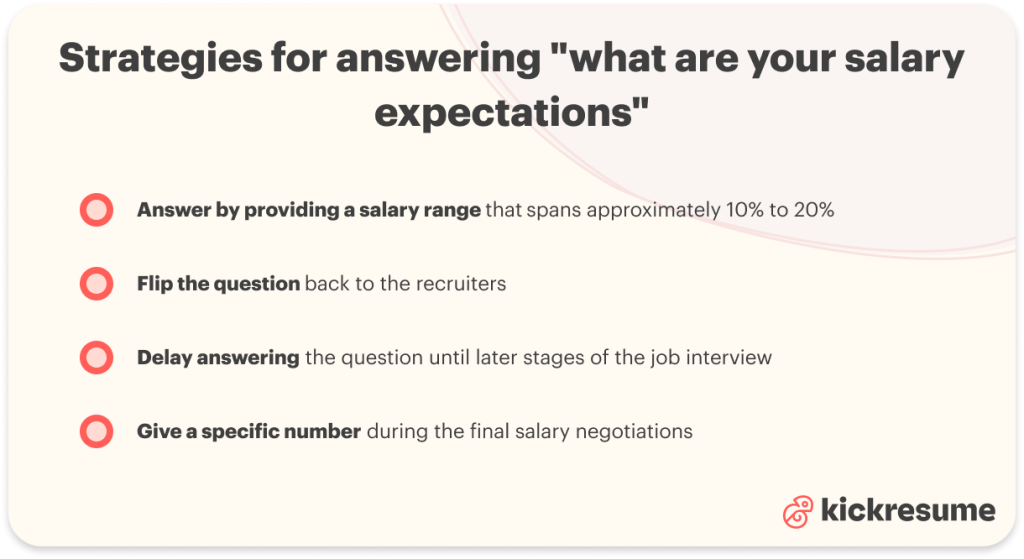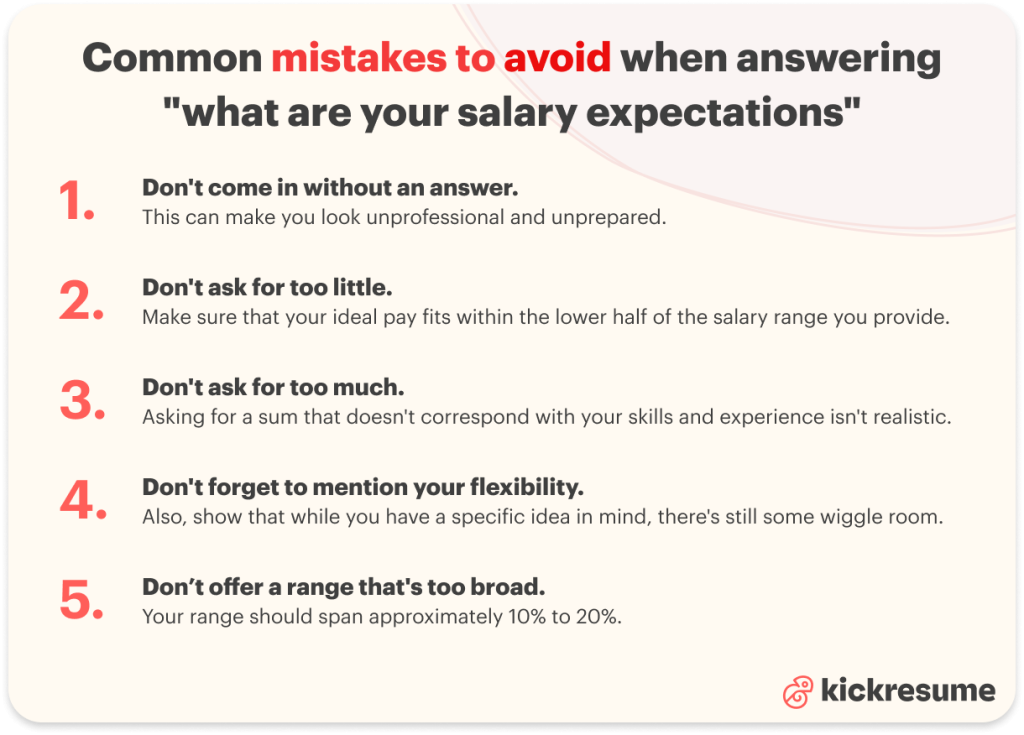“What are your salary expectations" is one of the most important questions you're bound to face during the job interview process.
The pursuit of higher pay is the main reason why 63.4% of Workable research respondents seek out new job opportunities. Yet, nothing can make most of us sweat quite like the idea of talking money with recruiters.
And that's because it's really easy to miss the mark. If you ask for too much, you risk pricing yourself out of the race; but if you ask for too little, you may undersell your skills and expertise.
But, the good news is that there's a way to answer this question without feeling uncomfortable or awkward. And we know how!
Our article shows you:
- What the question actually means;
- How to answer “what are your salary expectations;”
- What are your salary expectations - best answers samples;
- And, what things you should avoid doing.
- Understanding the question
- When can you be asked about your salary expectations
- Prepare your answer in 4 steps
- Where to look for the numbers
- What are your salary expectations — best answers
- Common mistakes to avoid when answering "what are your salary expectations"
- Tips on how to answer “what are your salary expectations” with confidence
- Key takeaways: How to answer “What are your salary expectations” in a job interview
Understanding the question
First of all, let's unpack the question itself!
Unlike many other common interview questions, you can actually take this one at face value. When recruiters ask “what are your salary expectations”, it's usually because one of these two reasons:
- They want to know whether they can afford you. And this is for a purely pragmatic reason. You see, every job position has a certain budget that needs to be respected. And this budget is set by people in high places, so the recruiters have to find a candidate that fits within that limit.
- The budget for the position is yet to be set. Or, the recruiters might be scanning the candidates who applied to see what kind of salary range they should propose to their higher-ups.
When can you be asked about your salary expectations
Obviously, the job interview process is a process, meaning that it's made up of several phases. And the money question can pop up:
- On the application form. Although this is quite rare, it happens. Especially if you're submitting your job application via the ATS. After all, it makes for the perfect “knock-out” question.
- Early on in the interview process. For example, some employers like to ask about salary expectations already during the phone vetting simply to see if investing more time in a particular candidate makes sense.
- During the final stages. Or, the topic may come up during the latter stages of the interview process to move on to salary negotiations.
… so, basically anytime. And that's exactly why you should start preparing your answer ASAP.
Prepare your answer in 4 steps
Your prep time for the “what are your salary expectations” question may be longer than you think. Sure, you could always just say any random number and cross your fingers. But that would be a pointless waste of an opportunity to increase your chances of receiving the job offer.
Instead, you should take these 4 steps to give a tangible and well-prepared “what are your salary expectations” answer:
- Research the salary trends.
Firstly, you need to do a bit of digging. Because your salary also depends on several factors that are outside of your control. Researching these areas gives you a good guess of how much to expect:
— Overall industry trends. Some industries are simply more lucrative than others, depending on current market demand.
— Average salaries for your career level. Of course, managerial positions are rewarded more handsomely than entry-level positions.
— Your location. Also, there can be considerable pay gaps between people working in the capitol and those in smaller towns.
— Private vs public sector. Generally speaking, the private sector usually offers bigger compensation than the public sector or non-profits.
— Company size. And, big corporations can pay you more than startups. - Take account of your bargaining chips.
And this can include anything you can leverage to your advantage during potential salary negotiations. For example: your skills, years of experience, depth of expertise, degrees and certifications, or past professional achievements.
- Weight in your lifestyle.
Another step is to take a good look at your monthly expenses. How much do you need to maintain your lifestyle? How much will you be left with after tax deductions? Do you want to buy property in the near future? Or take out a loan? And what about children?
- Consider the whole compensation package.
Because sometimes you might be willing to lower your salary expectations in exchange for benefits like health insurance, retirement contributions, paid maternity leave, sick days, remote work possibility, or professional development programmes.
Following these steps won’t only help you form a realistic idea of how much you can ask for, but also what salary you're likely to be offered.
Where to look for the numbers
You shouldn't simply jump into your research without knowing which sources are trustworthy. Therefore, we recommend starting with the following:
Of course, you should also seek out other information channels, such as LinkedIn, or direct contact with a person working in the company you want to join (A dream scenario, right?).

What are your salary expectations — best answers
As we've shown before, the “what are your salary expectations” question can be waiting around any corner of the job interview process. But every situation is unique and almost impossible to predict to the smallest of details.
So, to give you a chance to prepare your answer with confidence, we'll show you 4 strategies you can apply in different scenarios:
- Answer by providing a range
- Flip the question
- Delay answering
- Give a specific number
Let's look at each of them separately!
Strategy #1: Answer by providing a range
Providing a salary range instead of a specific number is a great strategy for the early stages of the interview process, because you won't back yourself into a corner from the get go.
But before you start setting any firm boundaries, keep this in mind — hiring managers tend to aim for the lower end of the scale once you've revealed your preferred salary range. So, if you have an ideal number in mind, make sure it sits towards the bottom of your limit.
For example, if you want to receive somewhere between $80,000 and $95,000, you can give a range of $85,000 — $100,000. So that you'll end up happy even if the hiring manager gives you an offer below your original range.
And don't forget to also incorporate these elements into your answer:
- Provide justification for choosing this particular range. For instance, you can draw from the information you've gathered during your research (average salary for this position, your skills, any certificates, and so on).
- Mention that despite the range, you can still be flexible. And here, you can imply that your willingness to compromise depends on the whole compensation package they offer.
So, your answer when providing salary range can look something like this:
Providing a range example
Or like this:
Providing a range example
Strategy #2: Flip the question
You can also answer “what are your salary expectations” by redirecting the question back to the hiring manager.
Essentially, when recruiters ask about your ideal pay, they put you in a tricky position because you don't really know what they want to hear. And so, even if your answer is backed by thorough research, it doesn't have to be the right one.
But you can actually put the ball into their court and ask what their budget for the role is instead. And when the interviewer answers, you can simply confirm that your expectations are within that range.
For example:
And, if their answer is slightly below what you'd hope for, feel free to express it and add that you're still willing to consider the position, provided that the rest of the compensation package is interesting:
Strategy #3: Delay answering
Alternatively, if you feel that you don't know enough about this particular job position to make a well-informed answer, it's pretty valid to delay your response.
After all, it's tricky to decide what you'd like to receive for your efforts when you don't really know what the job entails. Because, let's face it, job postings can be pretty vague in this sense.
However, this is probably the option we recommend the least! It can make you look hesitant or that you lack confidence. So think about it carefully before committing to the bit.
But if you do decide to go for it, your answer could look like this:
Delay answering example
Strategy #4: Give a specific number
And finally, as you approach the final stages of the interview rounds, you may find yourself pressed to give a specific number.
But this shouldn't be a problem. Because by now, you must've talked extensively about expectations from both sides. Just make sure to once again back up your answer by mentioning what you bring to the table.
Giving a specific number example
Common mistakes to avoid when answering "what are your salary expectations"
Crafting the perfect answer for the "what are your salary expectations" question is an alchemy, and even the most confident speakers can easily misstep.
But as long as you avoid these common pitfalls, you should be able to waltz your way through the answer with ease:
- Don't come in without an answer. Firstly, it automatically puts you into a disadvantage. Secondly, it can make you look unprofessional.
- Don't ask for too little. Recruiters want to settle for a sum that's most favourable for them, in other words, the lowest possible. So, make sure that your ideal salary fits within the lower half of the salary range you provide.
- Don't ask for too much. Conversely, asking for a sum that doesn't correspond with your skills and experience can make you look unaffordable. Yes, you should always be your biggest fan, but be realistic!
- Don't forget to mention your flexibility. Also, you should always show that while you have a specific idea in mind, there's still some wiggle room. This creates space for negotiations. And negotiations make both parties feel that they've accomplished something.
- Don’t offer a range that's too broad. Finally, try to keep your range relatively compact. Don't go for wild numbers like $65,000 — $120,000. That just shows that you have no idea what you're talking about. Your range should span approximately 10% to 20%.

Tips on how to answer “what are your salary expectations” with confidence
How can you seem cool, calm, and collected even if you're not? Well, just fake it till you make it!
Here's how to do that:
- Dress the part. Although this might seem superficial, the first impression sets the tone for the rest of the interview. So, make sure you know what clothes to wear.
- Practice your answers. Grab a friend, or a phone, and try to nail your delivery. A friend can give you immediate feedback in case you sound shaky, hesitant, or speak too softly.
- Control your body language. No slouching or fidgeting. Instead, sit up straight, maintain eye contact, and gesture only moderately. Don't let them see you sweat!
- Don't make your answers sound scripted. Even though articles like this one help you plan your responses ahead, let your personality and spontaneity shine through. A good job interview should feel like a conversation, not an interrogation.
Key takeaways: How to answer “What are your salary expectations” in a job interview
To sum it all up, it's practically impossible to avoid the “what are your salary expectations” question, no matter how uncomfortable it can make us feel.
So, to prepare an answer that's well-informed and realistic, we recommend following these 4 simple steps:
- Research salary trends that can help you form your response, including industry popularity, salaries for your career level, location, or company size.
- Take account of your bargaining chips such as: your skills, years of experience, depth of expertise, degrees and certifications, or past professional achievements.
- Weight in your lifestyle to determine how much money you need to maintain (or elevate) your current living standards.
- Consider the whole compensation package like retirement contributions, remote work possibility, or professional development programmes.
And while you're here, why not checking out how to prepare for other common interview questions:



